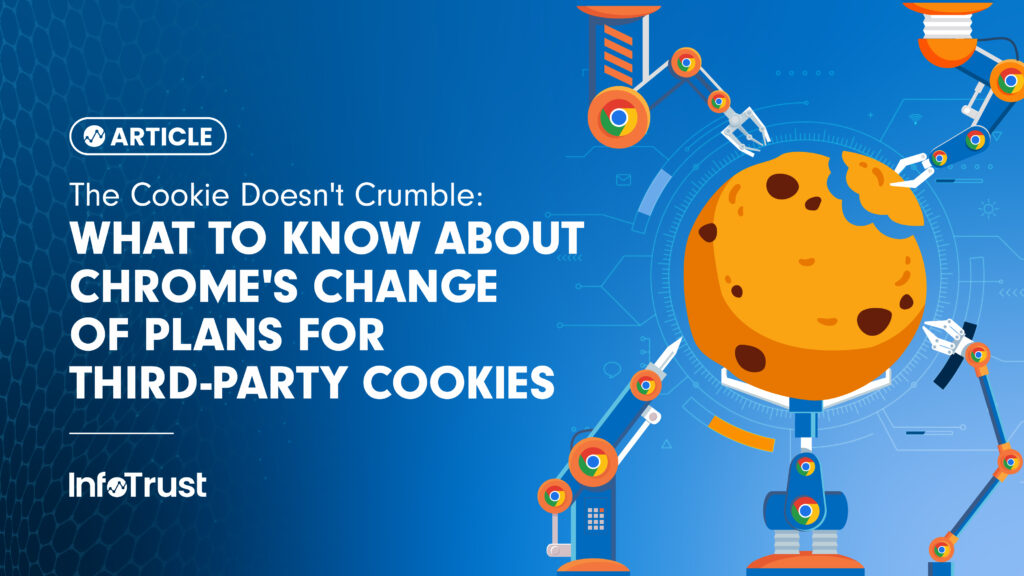For four years, Google has asserted their plans to deprecate support for third-party cookies in the most widely used web browser on the market, Google Chrome. The advertising industry has responded with a series of complaints, new solutions, and endless think pieces about what a future “cookieless world” will look like. Finally, after three separate delays, Google has now announced their decision to change the plan and not force third-party cookie deprecation in Chrome after all. While there is still news to come about what exactly the new plan is and how it will work, advertisers should begin to consider what has happened and what they should do.
What Happened?
On July 22, 2024, Google Chrome announced that they are abandoning plans to deprecate third-party cookies in Chrome. Instead, they will take an updated approach that “elevates user choice.”
From the release: “Instead of deprecating third-party cookies, we would introduce a new experience in Chrome that lets people make an informed choice that applies across their web browsing, and they’d be able to adjust that choice at any time.”
No details about the “new experience in Chrome” has been released at this time.
What We Know Now
- Chrome is changing course and will not deprecate third-party cookies in Chrome. As for what they plan to roll out to “let people make an informed choice”, that is very much to be seen. Much of the expected adoption and thus impact will depend upon how Chrome structures the user experience—defaults used, prompt language when users open Chrome to select their experience, ease of changing between experience options, etc. Beyond just adoption of the new experience, much is to be seen for what exactly will be blocked/modified to offer privacy protections to users. Will only third-party cookies be blocked? Will IP addresses be anonymized? Will there be additional fingerprinting protections included? As more details become available, we will update our POV and recommendations.
- On the advertising and analytics side, Google is maintaining their current guidance for the actions advertisers should be taking to prepare for a more privacy-focused web. This includes first-party data foundations for collection, leveraging in-platform AI optimization features, and using identifiable user functionality like Customer Match for more reliable targeting.
What Does This Mean for Advertising Strategy?
Not much should change from a strategy perspective for advertisers. Today, 25%+ of people have third-party cookies disabled (Safari, Firefox, any browser on iOS). This percentage is much higher in the United States and Europe for many brands. It is also true that privacy regulations provide consumers the legal right to opt out of the processing of their personal information to targeted advertising (in the United States) as well as require consent for the collection and processing of their personal data (EU + many other countries). Both of these facts equate to fewer signals available for measurement and targeting.
In addition, until there are more details for what the experience will be for the more private user experience option in Chrome, it is safe to assume that third-party cookies will continue to be slowly phased out in practice as more users adopt technologies which block them. If we look to Apple’s ATT initiative as a precedent, when users are given an explicit choice between cross-domain or cross-app tracking, 70-80 percent will opt out. If Chrome’s experience is similar, we would functionally have third-party cookies deprecated for 80-90 percent of the web population. This would put advertisers in a similar situation as if Chrome forced deprecation as planned.
What this does is more-so raise the “floor” for organizations relying on third-party cookies for things like measurement and targeting. The ceiling is still much higher (i.e. opportunity for competitive advantage) for organizations that adopt some of the new technologies more focused on first-party data. This all to say nothing of embracing consumer desire for a more private web experience through the use of non-third-party-cookie-based solutions.
What Does This Mean for Chrome’s Privacy Sandbox?
Google seems to still be committed to building out Privacy Sandbox APIs. Those solutions will likely be used as additive signals by adtech platforms to accomplish some advertising use cases. As we’ve seen from industry testing over the past couple of months, adoption of those APIs in adtech is still quite low, with the investment necessary to adopt them fairly high. Sandbox APIs will still be a thing that kind of lurks in the background and they could become a foundation for some additive innovation, but that will be more on the adtech side and built in the background (slowly) within platforms.
What Does This Change as Far as Planned Privacy-Centric Initiatives?
Current and planned “cookieless” initiatives are still worthwhile. Things like server-side tag management still confer benefits around data control, mitigate compliance risks, and provide the foundation for additive value use cases where first-party data can be used to enhance advertising and measurement outcomes. At the same time, initiatives focused on first-party data collection and analysis still provide more meaningful insight, as well as more meaningful inputs for optimization than any solution built upon third-party cookies.
“User Choice” Capability in Chrome to Adjust the Experience
So much of the impact and where the industry ends up will depend upon the user experience in Chrome to give users choice in their privacy protections and how this gets built out. On the one hand, this could just be like Incognito Mode currently in Chrome but with third-party blocked by default instead of requiring additional settings manipulation. As proven in the Google Search antitrust suit, defaults matter a lot. If this isn’t the default experience, but rather requires changes in deeper Settings options, then adoption will likely remain pretty low. If the experience to enable this new “mode” is instead a forced, easy prompt like Apple’s ATT prompts are for apps on iOS, then the impact could be significant. The range of possible adoption rates is huge and impossible to project until more details are available.
Aside from the user experience for enabling it, we also don’t know what “protections” the new Chrome user experience actually gives to consumers. What is blocked? Just third-party cookies? Some tag requests? Will IP protection be included? As more details about these specifics are released, we will continue updating with projections and likely impacts.
What Should Advertisers Do Today?
Continue the path to privacy-centric marketing! Just because Chrome is changing their approach for the deprecation of third-party cookies does not change the fact that consumers are demanding privacy protections and remain skeptical of how organizations are using their personal information. Strategies built upon consented first-party data remain more reliable while also being much more respectful of consumers’ privacy expectations. Organizations that continue to embrace these solutions will have an opportunity for additive value realization and competitive advantage over those that remain satisfied with the status quo.
Unlock the power of your data to enhance marketing performance and drive growth. Our experts are ready to answer your questions, uncover valuable insights, and maximize results. Let’s talk—reach out now!


